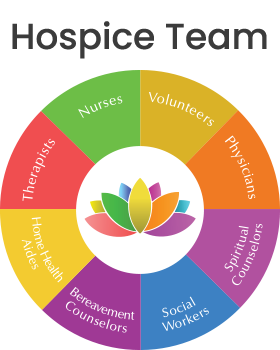Families who come to Essence Hospice for help receive services customized to their needs. These services can include:
Help with bathing and personal care
Many people feel better after a bath. Shampooed hair that is nicely styled and a good shave or a little makeup can do wonders for self-esteem. Seriously ill individuals, however, are often unable to bathe or groom themselves. Assisting another person in and out of the tub or shower can be physically demanding. When a family member tries to provide this care, they run the risk of injuring the loved one or themselves. Our certified home health aides have been trained to safely move people. Having one of our aides visit two or three times a week to help with bathing and grooming relieves family members of worry and risk. At Essence Hospice, we know there are many things that only family members can provide. By letting our aides help with tasks such as bathing and grooming, family members can focus on spending time with their loved one.
Home visits from your hospice team several times a week
Wherever a patient calls home (a private home, assisted living or board and care or a skilled nursing home facility), members of our staff come to visit several times each week. A nurse may visit to check on the patient’s condition, answer questions, and recommend changes in medication, diet, equipment, or supplies. Depending on the needs of the patient or family, other visitors may include home health aides, a social worker, a chaplain, and/or a volunteer. These professionals offer important advice and support to family and friends who are delivering day-to-day care.
Management of pain and other difficult symptoms
Our staff is trained in “palliative care,” a branch of medicine that focuses on easing pain and discomfort and providing symptom management. In palliative medicine, “pain” can include physical, emotional and spiritual distress. As a result, our team is holistic in its approach. When our staff feels the best remedy for a patient is a change in medication, we will ask the doctor for a prescription. But other times the remedy may be to change a sleeping position, modify, or simply talk through an emotional issue and gain clarity on a difficult family concern.
Emotional and spiritual support
Serious illness and facing the end of your life or a loved one's brings up many difficult questions, fears, worries and concerns. Essence Hospice staff has received special training to help people address these issues. Our social workers, chaplains or nurses can meet with the patient or the entire family. They can help everyone come to a better understanding of the situation and determine how to meet everyone’s needs with grace and love.
24-hour assistance and advice
Nights and weekends can be intimidating but they don’t have to be. Patients of Essence Hospice and their families are encouraged to call the office 24 hours a day, seven days a week. We have licensed professionals available to answer your questions. It is not necessary to wait until morning if your loved one is in pain. You call and we will respond. If it’s something we can help with over the phone, great. If not, our staff will come to your home to check the patient, offer recommendations, and make sure you are comfortable with the treatment being suggested.
Patient and family caregiver education
With all the rush and commotion in the doctor’s office, it’s not always easy to remember everything you’ve been told – or even what you wanted to ask. Our nurses are available to answer your questions. In the comfort of your home, our staff can explain the disease and the medical issues that surround it. They understand the day-to-day impact of living with your loved one’s condition: the symptoms, side effects of treatment and progression of the illness. We’re here to help in any way we can. Even in the context of an incurable condition, knowing what to expect helps many patients and families relax and feel less anxious about the process.
Coordination of multiple services
Pharmacies, doctors, equipment suppliers, home visits… it can be mind boggling to juggle all the different services and providers your loved one may need in order to stay comfortable. Our staff will coordinate multiple services so that caregivers can concentrate on their loved one’s daily needs without worrying about paperwork, shopping for providers, arranging for physician orders, etc.
Help for family caregivers
At Essence Hospice, we know that family members, friends and caregivers are valuable members of the caregiving team. Their special connection helps the patient feel comfortable and safe. But we also realize these caregivers are undergoing a very stressful and difficult time. Our goal is to support them, emotionally and physically, so their health is not compromised. Our social workers and chaplains are available to help the family as they process the powerful issues that often arise when a loved one is seriously ill; this is necessary so that family caregivers are able to maintain their own strength and health. We can also arrange for respite care for a patient, to give the caregiver a much-needed break from the demands of caregiving. Respite care may be utilized for a patient when the caregiver has to go out of town overnight or is sick themselves.


